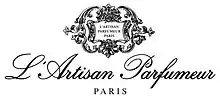L'Artisan Parfumeur
L'Artisan Parfumeur is a French niche perfume house owned by Puig company from Spain, which also owns British perfume house Penhaligon's.[1]
 | |
| Type | Subsidiary |
|---|---|
| Industry | Beauty |
| Founded | 1976 |
| Founder | Jean Laporte |
| Headquarters | , France |
| Products | Fragrances personal care |
| Parent | Puig |
| Website | www |
History
L’Artisan Parfumeur was established in 1976 by Jean Laporte.[2] In 1982, he left the company, going on to form rival Maître Parfumeur et Gantier in 1988.[3][4]
L'Artisan is based in Paris—the original store opened on Rue de Grenelle in 1979[4]—but now has outlets worldwide.
L’Artisan's 2012 release Seville à l’aube was the subject of the book The Perfume Lover, a memoir by Denyse Beaulieu describing her collaboration with French perfumer Bertrand Duchaufour to develop the scent.[5] Together they went through more than 100 modifications to develop the fragrance with notes of orange blossom, incense, smoke, beeswax, flowers and musk.[5]
In January 2015, private equity firm Fox Paine & Company, then L’Artisan's owner, sold the company to the Spanish perfume group Puig (along with British perfume line Penhaligon's).[4]
Products
It specialises in unusual fragrances, working with master perfumers such as Michel Almairac, Evelyne Boulanger, Bertrand Duchaufour, Jean-Claude Ellena, Dora Baghriche-Arnaud, Elisabeth Maier, Karine Vinchon, Fabrice Pellegrin,[2] Olivia Giacobetti,[2] and Anne Flipo.[2][6] The emphasis is on scents from nature.
The company sells candles and home fragrances as well as fragrances.
Perfumes
Fragrances (with date of release):
- 2020
- Couleur Vanille [7]
- 2016
- Bucoliques de Provence[2]
- 2014
- Haute Voltige
- Rappelle-Toi
- Onde Sensuelle
- 2013
- Caligna eau de parfum
- Amour Nocturne
- Deliria
- Skin on Skin
- 2012
- Séville à L'Aube[5]
- 2011
- Fleur d'Oranger 2011
- Mon Numero series (1, 3, 4, 6, 7, 8, 9, and 10)
- Batucada
- 2010
- Nuit de Tubéreuse
- Coeur de Vetiver Sacré
- Traversée du Bosphore
- 2009
- Côte d'Amour
- Vanille Absolument (first called Havana Vanille)
- Al Oudh
- 2008
- Fleur de Liane
- Aedes de Venustas
- Mûre et Musc Extrait
- 2007
- L'Eau de Jatamansi
- Iris Pallida 2007
- Fleur d'Oranger 2007
- L'Echange
- 2006
- Dzongkha[4]
- Fleur de Narcisse 2006
- Fou d'Absinthe
- Mandarine Tout Simplement
- L'Été en Douce
- 2005
- La Chasse aux Papillons Extrême
- Extrait de Songes
- Ambroisie Ararat
- Fleur d'Oranger 2005
- 2004
- Ananas Fizz
- Jour de Fête
- Timbuktu[4]
- Eau de Printemps
- 2003
- Bois Farine
- Premier Figuier Extrême
- Un Zeste D'Été
- 2002
- Safran Troublant
- Poivre Piquant
- Piment Brûlant
- Patchouli Patch
- 2001
- Ambre Extrême
- Framboise Tralala
- Une Bouquet en Mai
- Thé des Sables
- 2000
- Tea for Two
- Jacinthe des Bois
- Oeillet Sauvage
- Verte Violette
- Fleur de Carotte
- 1999
- 1998
- Navegar
- Sautes d'Humeur: A Rire
- Sautes d'Humeur: Reveuse
- Sautes d'Humeur: A Rien
- Sautes d'Humeur: Jalouse
- Sautes d'Humeur: Massacrante
- 1997
- Méchant Loup
- L'Eau du Floriste
- 1996
- Thé Pour un Été
- Drôle de Rose
- 1994
- Premier Figuier[2]
- 1993
- Voleur de Roses
- Mûre et Musc Extrême
- L'Eau de L'Artisan
- 1992
- Mimosa Pour Moi
- 1990
- Riviéra Palace
- 1989
- Alchimie Pourpre
- Eau des Merveilleuses
- 1985
- Orchidée Blanc
- L'Eau du Caporal
- 1984
- Bouton d'Or
- 1982
- La Haie Fleurie du Hameau
- Les Hesperédés de la Grande Sierre
- 1979
- Patchouli
- L'Eau du Navigateur
- 1978
- Vetiver
- Vanilia
- Tubéreuse
- Santal
- Mûre et Musc[2]
- L'Eau d'Ambre
Some of these fragrances are no longer in production.
Limited editions
Beginning in 2005, L'Artisan has issued a limited edition "grand cru" soliflore perfume each year from a specific harvest of a particular flower. The creator of the fragrances is master "nose" Anne Flipo. Production is limited to a few thousand bottles each. The price is considerably higher ($250–$295 per 3.4 ounce bottle) and the packaging more elaborate than for the regular fragrances. These include:
- Fleur d'Oranger 2005 (Orange blossom harvest of April 2004 from Nabeul, Tunisia)
- Fleur de Narcisse 2006 (Narcissus harvest of June 6–7, 2005 from Lozère, France)
- Iris Pallida 2007 (Tuscan iris harvest of 2001). Iris scent molecules take three years to form in the roots (rhizomes) of the iris plant. These roots are dried, ground into colloidal powder, and treated with alcohol to make orris butter, the precious pure absolute of the Iris pallida plant. It takes 41 tons of iris root to produce one kilogram of rhizomal extract.
- Fleur d'Oranger 2007 (Orange blossom harvest of April 2006 from Nabeul, Tunisia)
References
- Weil l, Jennifer (2020-11-30). "L'Artisan Parfumeur Goes Back to Its Roots". WWD. Retrieved 2021-04-12.
- Ellenberg, Celia (April 22, 2016). "3 L'Artisan Parfumeur Fragrances That Are Destined to Become Your Signature Scent". Vogue. Retrieved 2020-10-22.
- "Inside The Brand - L'Artisan Parfumeur (EN)". www.artisanparfumeur.com. Retrieved 2020-10-22.
- Stocks, Christopher (2016-05-18). "Parisian pedigree: L'Artisan Parfumeur relaunches its classic French fragrance line". Wallpaper*. Retrieved 2020-10-22.
- Hamilton, Denise (2012-05-20). "Scent perfumes their pages". Los Angeles Times. Retrieved 2020-10-23.
- "Inside the Brand - l'Artisan Parfumeur (EN)".
- Smiedt, David (May 19, 2020). "6 New Fragrances That Will Make This Your Best-Smelling Autumn Yet - GQ". GQ Australia. Retrieved 22 October 2020.